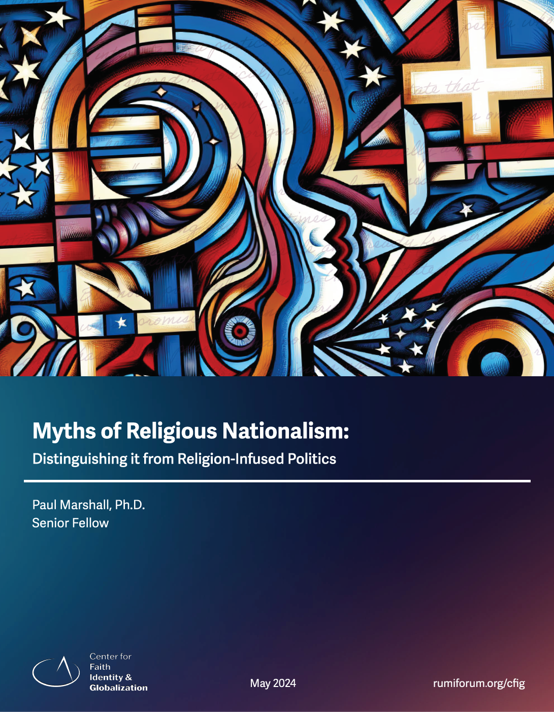RFI’s Paul Marshall recently wrote an article for Rumi Forum‘s Center for Faith, Identity, and Globalization titled, “Myths of Religious Nationalism: Distinguishing It from Religion-Infused Politics.” In it, Marshall takes readers on a tour through religious nationalism in the modern world, examining various ways it is understood and delving into what should, and should not, get placed into that category. Marshall focuses first on trends around religious nationalism in America before broadening his geographic lens. He writes:
The term “nationalism” has usually been used to describe an attachment, ideology, or movement promoting the interests of a particular nation, a group of people who believe they have a shared historical, cultural, lingual, and/ or religious heritage, and commonly wish to have a state that expresses this heritage.
I had initially intended to focus on “religious nationalism” in the world generally since religiously infused nationalism is a growing and sometimes dangerous trend in the modern world and is likely to unsettle an already fractured international system further.
However, the use of the term has grown so promiscuously in America’s polarized politics that its meaning has become plastic and is now bent on serving shorter-term political agendas. Hence, “religious nationalism” or “white religious nationalism” have now joined “secular,” “liberal,” “populist,” “fundamentalist,” “Marxist,” “woke,” and other terms, including the ever-popular “fascist,” as terms of vague praise or blame divorced from any substantive content. Alexis de Tocqueville noted two centuries ago that an “abstract word is like a box with a false bottom: you put into it the ideas you want and take them out again unobserved.”
In the United States, some claim that “religious nationalism,” “Christian nationalism,” or even “white Christian nationalism” is a significant, growing, and dangerous movement. There have been articles and segments in 2024 in PBS, Axios, NPR, the New York Times, and many other outlets, as well as a documentary “God and Country,” that, despite earning little more than $38,000 nationwide during its opening weekend, garnered undue attention.
Many books also criticize these movements, most repeating the same vague analysis. In response, I will illustrate how these issues exist in the modern, international world and argue that we must carefully distinguish those who believe that their religion, or irreligion, should shape their politics, probably the vast majority of people in the world, from those who fuse such views with an exclusive and pernicious nationalism.
It is well worth reading the entire piece, to include the arresting anecdote with which Marshall concludes: “Myths of Religious Nationalism: Distinguishing It from Religion-Infused Politics.”

THE RFI BLOG

Is Egypt’s Government Trying To Take Over Christianity’s Most Important Monastery?

Does Southeast Asia Lead the World in Human Flourishing?

RFI Leads Training Session on Religious Freedom Law and Policy for U.S. Army War College

Oral Argument in Charter School Case Highlights Unconstitutional Motives Behind OK Attorney General’s Establishment Clause Claim

Largest Longitudinal Study of Human Flourishing Ever Shows Religion’s Importance
CORNERSTONE FORUM

Reaffirming Religious Freedom: Bridging U.S. Advocacy and Iraq’s Constitutional Framework

Political Polarization, Same-Sex Marriage and Religious Liberty

Bridging the Gap Between International Efforts and Local Realities: Advancing Religious Freedom in the MENA Region

Challenges to Religious Freedom in Iraq and the Critical Need for Action

